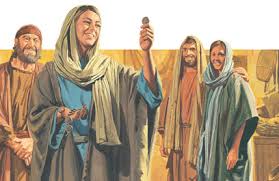The Parable of the Lost Coin
Luke 15: 8-10
The parable of the lost coin DIG: How is this parable, and the parable of the lost sheep the same? How are they different? How do you picture the woman searching for her lost coin? What would the attitude of the Pharisees be toward this woman? What does the Bible say?
REFLECT: How does this parable make you feel about your value to God? How might this parable affect your relationships with unbelievers you know?
The one main point to the parable of the lost coin is what touches the heart of God most deeply is the salvation of those whom He pursues and brings to repentance.
If the Pharisees wanted to give a snappy comeback to Messiah’s parable of the lost sheep (to see link click Hs – The Parable of the Lost Sheep), they didn’t respond soon enough. No sooner had Yeshua concluded His previous parable than He was on to another parable about a lost coin. He said: Or suppose a woman has ten silver coins and loses one. The silver coins were denarii. One denarius equaled a good day’s wages, an example of what the landowner paid his laborers in the parable of the workers in the vineyard. Doesn’t she light a lamp, sweep the house and search carefully until she finds it (Matthew 20:2; Luke 15:8)?
No doubt the women in the group leaned forward in anticipation. When a Jewish girl married shortly after her bat mitzvah, she began to wear a headband of ten silver coins to signify that she was now a wife. It was the Jewish version of our modern wedding ring, and it would be considered a calamity for her to lose one of those coins.1099 Messiah told of a woman who had a band on her head with one lost coin, and asked them to consider how such a woman in this position would react. Would she sit back and hope that it turn up on its own? Certainly not.
She began an all-out search-and-rescue mission. Distraught because of the loss, she lights her lamp and thoroughly sweeps the floor of the dimly lit house, and turns it upside down until the shining coin is found. The Ruach Ha’Kodesh, fittingly symbolized as the woman in this parable, makes a diligent, and thorough search in every corner of the heart of the lost soul. Sinners are so precious in God’s sight that no effort is too great to reclaim them. There was earnestness, thoroughness, and persistence until the result was obtained.1100
My wife rarely takes off her wedding ring, but one time she did and our son young got ahold of it. There was no piece of furniture, rug, appliance or jar left unturned until it was safely back where it belonged. Sheer panic melted into sweet relief at the moment it was back on her finger.

Then she rushes over to the homes of her neighbors and breaks the wonderful news of the recovery of her lost coin, inviting them to rejoice with her. And when she finds it, her joy was as great as the shepherd’s in the previous parable. Like the shepherd, she calls her friends and neighbors together and says, “Rejoice with me for I have found my lost coin” (Luke 15:9). She could not conceal the joy and gladness in her heart. This parable makes basically the same point, but with a different metaphor. It pictures the loss, search and recovery of the lost soul with the resulting joy.
Again Yeshua ends the moral of the parable with a passionate declaration: In the same way, I tell you, there is rejoicing in the presence of the angels of God over one sinner who repents” (Luke 15:10). Notice that the rejoicing is done in the presence of the angels. It does not say the angels were joyful. Then who is rejoicing? It is the joy of the triune God, existing in the presence of the holy angels. Of course, the angels share in the celebration, but the emphasis in both parables is on God’s joy.
The Pharisees taught that there was joy in the presence of God when sinners die. Had they been careful students of the Scriptures, the Pharisees would have had a better understanding of this aspect of ADONAI’s character. The TaNaKh revealed Him as a God of compassion. Ezeki’el 33:11 says, “As I live,” swears Adonai ELOHIM, “I take no pleasure in the death of the wicked.” Isaiah 62:5 says: As a bridegroom rejoices over the bride, so your God will rejoice over you. This is exactly the image of these two parables. It is uncontained joy, pure delight, and unrestrained celebration.1101 The point would have been clear to Messiah’s listeners and should be clear to us: the sinners with whom He was associating were extremely valuable to ADONAI. Should the same also not be true for us today?



what are represented by ten coins ,what is lost one.?
As in the Parable of the Lost Sheep before it, where there is more rejoice in heaven over the repentance of one sinner that over ninety-nine righteous persons who do not deed to repent, here, in the parable of the Lost Coin, God again rejoices in the presence of the angels over repentance of one sinner. In both parables these are lost souls who come to repentance of their sinful life and believe in Yeshua Messiah as their Lord and Savior.